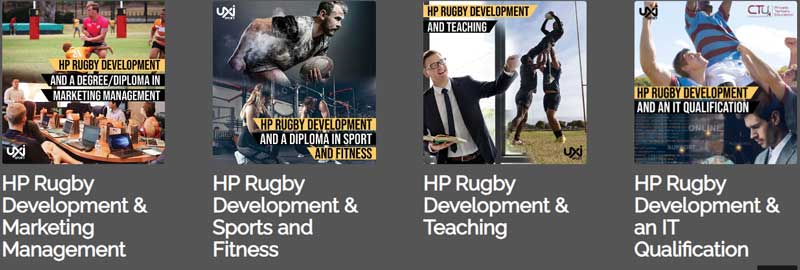Rugby players must possess more than simply skill to succeed in the professional ranks. It may open up a variety of non-playing job opportunities. Let’s examine the thrilling adventure and the various directions it can lead you.
The Path to Professional Rugby
Mastering Core Skills
To embark on a successful rugby career, aspiring players must play rugby at the amateur level, honing their skills and gaining experience. Participation in local clubs and leagues provides a platform to showcase talent and attract scouts from higher levels, including professional teams and rugby clubs.
Advancing to Professional Rugby
Rugby amateur leagues are where you must start if you want to play professionally. You can then advance to semi-professional teams. You can finally join a qualified squad. Through this evolution, players are exposed to tougher competition and given chances to succeed.
Career Opportunities Beyond the Field
Rugby players’ career development is a complex process that goes beyond the playing field. In order to develop their skills and gain experience, aspiring players frequently begin by deciding whether a rugby career is the best match for them, getting in touch with local clubs, and enrolling in youth academies. One typical route to the peak of a professional rugby career is to go through many divisions, including amateur leagues and semi-professional teams.
It is UXi Sport’s mission to ensure that players have careers after they hang up their boots, as injuries are a reality as well as unforeseen life events.
After finishing your playing career, you can pursue a variety of jobs in the health and wellness sector, including those in sports management, administration, broadcasting, video and game analysis, coaching, marketing and entrepreneurship. Corporate collaborations, instruction, mentoring, and community involvement are other channels that show a comprehensive approach to development on the personal and professional levels.
In South Africa there is a huge demand for qualified and experienced coaches, video and game analysts at junior and senior level.
Rugby players’ welfare and development are aided by programs like post-career programs and job placement, which provide all-encompassing support after their playing days.
Skill Transition: Beyond the Field
Rugby players must decide what to do after reaching the height of their careers. It is a natural progression to apply talents learned on the field to careers outside of rugby. Teamwork, leadership, and self-control are highly transferable to a variety of professional settings.
All players entering the UXi High Performance rugby development program undergo aptitude and personality testing to assist players to find the most suitable study option for them.
During the rugby development’s demanding schedule time is allocated for their studies and internships. The UXi Education providers structure the academic program around the needs of the rugby program so that players have the best possible opportunity to cope with both.
Sports Management and Administration
Numerous former players found successful professions in sports administration and management. Their in-depth knowledge of the nuances of the sport is utilised in roles such as team management, event coordination, and sports administration.
Broadcasting and Media
By working as sports analysts or commentators in television and the media, former players might maintain a connection to the sport. Additionally, by choosing this job path, they can reach more individuals.
Entrepreneurship in Fitness and Wellness
Some participants enter the fitness and wellness business as entrepreneurs by drawing on their extensive understanding of physical fitness. Athletes and fitness aficionados are catered to by opening gyms, wellness centres, or providing specific fitness programs.
Study a professional Strength and Conditioning program through HFPA or Personal Training, that earns REPSA accredited points for international recognition.
Corporate Partnerships and Sponsorships
Making solid connections within the rugby community creates prospects for rewarding business alliances and sponsorships. Players can use their reputation and personal brand to partner with brands or endorse products, generating new cash sources.
Following a Program such as Sports Events Management and Marketing can be extremely beneficial for careers in these fields. UXi IMM offers various Marketing and Social Media short and full qualifications.
Education and Mentorship
Many athletes find joy in teaching and mentoring positions. Young players benefit from the knowledge that coaches, mentors, and educators impart, which advances the sport.
Programs such as Coaching Science including an internship program at UXi Sport HFPA can assist a player to pursue a career in Coaching at various levels.
Community Engagement and Social Impact
For former athletes, becoming involved in the community and having a positive social influence is satisfying. After their playing careers are over, they can continue to give back and create a lasting legacy by participating in social programs, community projects, and charity work.
World Cup and Rugby Union
A rugby player’s career high point is taking part in prominent events and competition like the Rugby World Cup. This well-known international competition not only raises one’s profile but also provides a forum for showing remarkable talent.
It is impossible to emphasise the importance of playing against the top athletes in the world because it offers a rare chance to demonstrate one’s abilities and ability in the sport. It is a source of great pleasure and responsibility to represent your country at the Rugby World Cup because it goes beyond individual success to serve as a symbol of the nation’s overall rugby strength.
UXi Sport is proud of alumni such as Kurt-Lee Arende and Grant Williams who both are currently participating at this highly ranked competition.
The fact that the entire globe is watching this competition creates a platform where players can make a lasting impression with their performances. In addition to being a personal success, winning the Rugby World Cup is a testimonial to the team’s commitment, talent, and cohesion. It creates enduring memories, promotes a sense of pride in one’s country, and adds to the illustrious history of rugby.
Frequently Asked Questions
Q: What requirements must you meet to play rugby?
A: While there are many different requirements for rugby players, commitment, talent improvement, and involvement in neighbourhood leagues and clubs are crucial. Progress through the amateur and semi-professional categories is typical to get to the professional level.
Q: Can I play rugby professionally if I didn’t start playing as a child?
A: Individuals of any age can begin playing rugby. Early exposure is advantageous, but any stage of a rugby career can be successful with commitment, effort, and skill improvement. At UXi Rugby Institutes we have seen many players who reached Currie Cup level with no great past play experiences, All it takes is hard work and commitment – it almost always beats talent!
Q: Can women pursue a career in professional rugby?
A: Absolutely. Women’s rugby has gained immense popularity, offering numerous career opportunities. Aspiring female players can engage in training, showcase their skills, and pursue professional paths within the sport.
Q: What are the key steps to becoming a professional rugby player?
A: Achieving a career as a professional rugby player requires dedication, hard work, and a personality that thrives under stress. Essential steps include playing at the amateur level, progressing to semi-professional teams, and eventually joining a qualified squad. You can start today by making a choice to join a reputable rugby institute with credible coaches who puts your development first!
Q: Are there career opportunities beyond playing on the field?
A: Yes, the career development of professional rugby players extends beyond playing. After finishing their playing careers, individuals can explore roles in sports management, administration, broadcasting, entrepreneurship, education, and community engagement.
Q: How long is the typical career span for a rugby player?
A: Rugby players typically have short careers, lasting seven to ten years on average. However, factors like injuries and individual circumstances can influence the duration of a player’s career.
Q: Are there opportunities for rugby players in sports administration and management?
A: Yes, many former players find successful careers in sports administration and management, leveraging their in-depth knowledge of the sport.
In conclusion, starting a professional rugby career is a thrilling and complex adventure that goes well beyond the confines of the playing field. Aspiring athletes can go through many tiers, starting in amateur leagues and moving up to semi-pro teams until eventually joining a qualifying team. The journey doesn’t end, though, when you stop playing.
Beyond the playing field, players have a variety of employment options, including sports management, administration, broadcasting, entrepreneurship, education, coaching, and community involvement. Programs like post-career support and job placement help athletes make the transition from a professional playing career to significant employment in sports-related sectors.
Furthermore, the physical demands of various rugby positions highlight how crucial it is to learn particular abilities and characteristics appropriate for each function. Players have excellent possibilities to represent their countries and display their talent on a large platform during the World Cup and other important games.
In essence, a professional rugby career entails embracing the overall development of abilities, character, and engagement in addition to sporting excellence. It’s a journey that calls for commitment, ongoing development, and a proactive attitude toward investigating other career opportunities both inside and outside the world of rugby.
Opportunities abound.
FIND OUT ABOUT UXI SPORT’S COMPREHENSIVE STUDY OPTIONS AND HOW TO ENSURE EMPLOYABILITY AFTER RUGBY!
ENQUIRE NOW



References
- careeraddict.com – How to Become a Professional Rugby Player
- uxisport.co.za – How to Become a Professional Rugby Player
- amazon.com – The Book On How You Become A Pro Rugby Player
- world.rugby – Coaching
- webber-nutrition.co.uk – Rugby Players Diet Plan- Nutrition and Workout Guide (2023)
- world.rugby – Training and Education Workforce Guide
- ruckscience.com – Rugby training and diet programs
- youtube.com – 10 TIPS TO BECOME A PRO RUGBY PLAYER FROM A PRO
- scielo.org.za – No time to waste: necessary health support for retired…
- wikipedia.org – Rugby union




